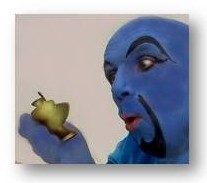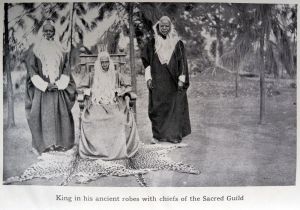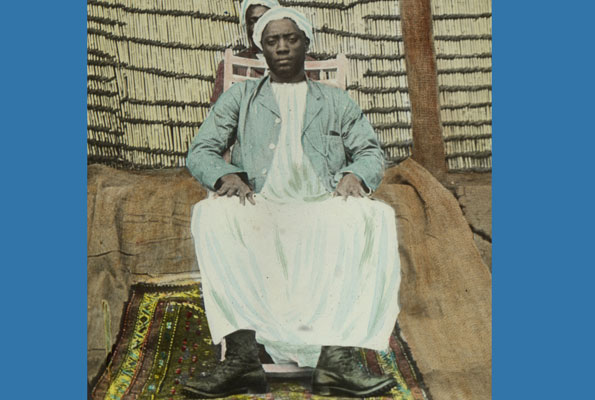by Peter van Gorder
Fears of the Future
1884 Bugandan Palace
While I was out plundering, the pages in the palace, where I used to work, were waiting to deliver messages or perform any other duties that were required. Of course, they heard the news of Mutesa’s death before we did.
As they were talking, a royal messenger came in and announced gravely, “Buganda’s fire has been extinguished. The kabaka has dropped his shield.” This was the official announcement that the kabaka had died.
The sacred fire, which was always kept burning as long as the kabaka lived, was extinguished and would not be lit again until the new kabaka was crowned. His drums were carried to a special place to be guarded until the new kabaka would inherit them.
As soon as the breath went out of the king Mutesa’s body, his son Mwanga ordered that three young princes, be seized and made prisoners. Later they were executed. Mwanga was afraid that they might claim the throne. However, Kiwiwa, who was Mwanga’s brother was left quietly in his own compound. In five years the course of events would put him on the throne of Uganda in Mwanga’s place.
Now, everyone looked to the future with uncertainty. One of the pages Gonza spoke, “What will our new lives be like under this new kabaka? We know him to be a cruel and vicious young man – yet unpredictable, like the waves of the sea – calm one day and then stormy the next.”
Another page named Anatola remarked, “– a man who could one day give his choicest meat to his dog and the next day starve his own people.”
The page Kyavira commented, “His father was a searcher of the truth. Like a man gathering fragrant flowers in a garden, he sought in both of the great beliefs for what truths he could find. For he thought a faith which is believed by so many people must have some truth to be learned from it.”
Balikudembe, who was one of the oldest of the pages and one of the few pages who could read, remembered more about the former kabaka. “Yes, that is true, he observed the Moslem holy month of Ramadan and was the first to receive Christians when they entered the land.”
I remembered that when they arrived he asked them, “Did you bring The Book?” Thankfully, they had brought it, for we have benefited much from its beautiful words.
Kabaka Mutesa spent much time having the two great books of the Koran and the Bible read to him. I have read the Bible myself to him. Once I heard him question the Christian, “Which book is true – the Koran or the Bible? For I have heard people speak evil of both books.”
The Christian answered, ‘Judge for yourself. There never was anyone yet who looked for the truth there and did not find it.”
Mwanga was not disappointed and found much truth in both books.
“Mutesa let us believe in God, but what will Mwanga do to us?” Gozon questioned.
They talked about these and many other questions until late that night.
They thought back to how they had first became Christians. Balikudembe had learned how to read and taught the other pages directly from the Word. Soon many of them had become believers after hearing the words of Jesus Christ himself. The first Christians had begun printing the Mateka, which was our first reading book. It contained the Apostles Creed, the Ten Commandments, The Lord’s Prayer, quotes, and key Bible verses. It was from this book that Balikudembe sometimes read to the other pages.
The first Christians taught people to read and write, for there was really no written language before they came. After learning to read, “readers” went to rural areas and read Bible stories to the villages. Readers could always be recognized by the little cloth skin bags that carried their precious books. Whenever they would enter a village, a circle of people would soon be craning their necks to see the pictures and try to look at the text, even though they did not understand it.
Gozon said, “What will become of us under this new kabaka? Will he cling to the old ways — will his heart go out to his people?”
“So much depends upon his decisions. He has had some learning with the Christian teachers, let us all pray desperately that God will touch his heart and he will remember what he has been taught,” Anatola suggested.
Mwanga
Mwanga was shorter than his father Mutesa and had a wider flater nose.
Throughout Mwanga’s reign, God did touch his heart. There were brief times when he was kinder to his people, but soon after he hardened his heart even worse than before. It would take him many years for him to learn to love his people and God.
Mwanga was fickle and changed his moods frequently. One time he would ask you if you liked swimming, sewing, and give you gifts and the next he was plotting your death. His soft paws concealed sharp cruel claws.
Unfortunately for his subjects, he lacked the common sense and wise experience of his father. It is said that power corrupts the best of men, so what could you expect it do to a man like Mwanga – an uneducated peasant? Suddenly he became a powerful emperor with the power of life and death over his subjects.
A council was held of the new kabaka and his prime minister, second minister, the chief of the kabaka’s bodyguard, other officials, and the priests from the traditional religions.
There were many preparations and decisions that had to be made for the funeral and the ascension to the throne. The new kabaka was just eighteen years old but very eager to take power.
Mwanga spoke, “I have called you to get your advice about the funeral proceedings and our future. As you know, my father wished that we would not follow the traditional* ways in his funeral.
[Traditionally at the death of the kabaka; 2,000 Makopi*, three chiefs, and three wives were sacrificed. *Makopi :peasants, literally ‘those without worth’]
For he has said that this was not to be. I ask your counsel if we should follow his advice.”
The priest of the god of plague, spoke, “You have asked if we should heed the wishes of your father. This we should do lest his ghost haunt us. Take heed to his request, lest he curse us and bring great suffering upon us.”
“Have you found the cause of death?” Mwanga asked his priests.
“We have, son of Ggulu*.” *[god of the sky]
“Speak now.”
“From our inspection of the entrails of a fowl and the spirits who have spoken to us, we have found that his death was caused because Kabaka Mutesa forsook the traditional ways.”
“We should fight these evil new influences of foreign religion,” the priest of the god of earthquakes said determinedly.
The priest of the god of lightning spoke, “Respect the wishes of your father, great one, and then you will no longer have to be obligated to him and may have a free hand to bring back the old ways.”
“Thank you for your advice. Now, I would like to ask you another question, a question about the future of our country. My father began to institute certain reforms and to be more merciful on my people. Should we continue his policy? – Or perhaps there is a better way – the way of strength.”
The old wise men were the first to speak, “It is for good reason that your father chose to be tolerant of other faiths. It is good to live in peace with all men. In peace our country grows prosperous. We can trade with our neighbors — we both grow strong together. Who knows? Perhaps some day we will unite and form a larger kingdom with the neighboring nations as friends. Oh, kabaka we implore you to show mercy and love to your people. Kindness and love are the greater way to show true strength.”
“And what say you, my good friends,” Mwanga said as he turned to his young counselors.
Mwanga’s friends approached him and whispered in his ear. After listening several minutes to them he rose and said, “I will make my announcement at the ascension.” At this everyone was dismissed and went about their duties.
Mwanga’s gang of evil boys that hung around him, caused a lot of trouble. They used to get stupefied smoking Indian hemp. They also persuaded me to smoke with them when I was page. Mwanga became especially irrational and cruel when he was under the influence of drugs.
At the funeral both Moslems and Christians made prayers for Kabaka Mutesa’s soul. The people wailed and cried. Many truly loved him, others were afraid that if they did not cry loud enough, they could be accused of having caused his death.
Mwanga Eats Up the Land
Ten days after the funeral rites a great ceremonial feast was held. There was eating, drinking, and sexual indulgence in abundance. The wild orgy party carried on all night.
In the morning Mwanga was lead to the hill of Budo to be crowned. As all the people gathered around him and waited in silence for their new leader to speak. Mwanga lifted up his voice.
“I am your new kabaka. Let all beware and take heed. For those who bow down and do obeisance I will let live, but to those who do not, I will show my wrath. My father beat you with a twig, but I will beat you with a rod. If any one would question my authority, let him come now and stand on the hill.”
No one dared to challenge him or by fighting through the many guards that surrounded him.
“As for the nations near us, let them give tribute to us. If they refuse, we will take that what we want. Why should I beg for that which is mine?”
The people who were listening could feel that a great shadow was falling over the land. Although, they hated the kabaka’s cruelty, they also held him in awe and reverence.
The priest of the god of the earth spread out his hands and said, “Behold the land is yours to eat up as you will. For all things that your eyes see are given into your hand.”
With these words, the kabaka was transformed. No longer was he a mortal but a superhuman, or so he was deceived into thinking. He had become a god to his people.
Some of my friends came rushing in to me with the news, “Mwanga has eaten Buganda.”
At length I went back to the king’s household thinking that I might work my way up in the palace to become an important man. Now I have a different perspective on what being successful in life means. It is in showing love to others that we find the greatest fulfillment in life not in seeking power for ourselves.
When I started working at the palace, I was surprised to find a great many of the pages could now read, some were reading the gospels, the prayer book, and others were still just learning the alphabet. For a while I decided to try harder to read. With the help of four of the other pages, I was able to learn the alphabet in two days and the syllables in four days. Then I stayed with a man who tried to teach me out of a Kiswahili prayer book but I made only a little progress because I was idle and didn’t try hard enough. The kabaka sent me on a mission to the Uzinja kingdom to collect their tribute. As we camped out for the night, one of the men who came with us, called Kibunda, explained to me truths from the Word of God. His teaching helped me to understand much more about the Lord. Throughout my life God brought people like Kibunda to bring me closer to the truth. But unfortunately, I did not always take heed to their teachings and had to learn the hard way. The seeds were planted and others were watering them.
When we returned, the kabaka was very pleased of us for bringing such rich tribute gifts. But there were many that the kabaka was not pleased with.
Mwanga’s father, Mutesa, had not been totally convinced of the truth of the gospel but throughout his reign the Christians had enjoyed liberty to carry on their work despite some setbacks. We learned to appreciate Mutesa more when his son Mwanga took the throne. He showed his bad character from the beginning.
(to be continued)



